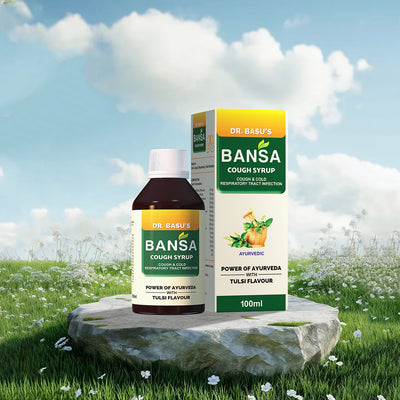
Health Benefits of Tulsi Leaves & Bansa Ayurvedic Cough Syrup
Tulsi (also known as Holy Basil) emerges as a prominent plant in Ayurvedic medicine due to its multiple uses as a sacred object and medicinal and therapeutic natural remedy. Tulsi maintains its position as a sacred plant but also functions as a primal health-enhancing natural resource which Indians cultivate in their home courtyards. Tulsi leaves have demonstrated their medical usefulness that strengthens immunity and supports digestive health during centuries of use. The health advantages of tulsi leaves together with their practical applications can be understood through a look at Bansa Ayurvedic Cough Syrup which utilizes tulsi-based components to support respiratory health.
What Are Tulsi Leaves?
As part of the mint family and with its scientific name Ocimum tenuiflorum Tulsi grows as a perennial aromatic plant that originates from the Indian subcontinent. Ayurvedic practitioners recognize tulsi as a Rasayana substance because it helps people live longer while restoring their vitality. Three primary species of tulsi leaves exist in nature including Rama tulsi with green leaves and Krishna tulsi with purple leaves along with Vana tulsi as the wild form.
Benefits of Tulsi Leaves
1. Boosts Immunity
Tulsi contains many beneficial antioxidants alongside vitamin C and phytochemicals that protect human bodies from infections and diseases. Tulsi leaves strengthen the body's protective capabilities which make them beneficial for cold and flu season.
2. Supports Respiratory Health
The plant substance Tulsi performs as both a natural vaporous decongestant and expectorant while simultaneously reducing inflammation in respiratory passages. Health experts recommend Tulsi leaves to treat cough and asthma symptoms and bronchitis and multiple other respiratory problems.
3. Reduces Stress and Anxiety
Tulsi behaves as a natural adaptive compound which enables our bodies to better cope with stress. The herb helps manage cortisol levels thereby improving mental clarity together with mood state.
4. Improves Digestion
Consuming tulsi tea through drinking or using its leaves in the mouth serves to minimize indigestion symptoms as well as eliminate bloating and reduce gas symptoms. This herb activates enzymes that support gastrointestinal health as well as promotes gut operation at a healthy level.
5. Regulates Blood Sugar Levels
The medicinal effects of tulsi support blood sugar stability which helps patients with type 2 diabetes.
6. Fights Infections
The antiviral antibacterial and antifungal elements in Tulsi allow it to fight multiple pathogens thus helping wounds heal more quickly.
7. Promotes Skin and Hair Health
The antimicrobial properties of tulsi enable it to treat acne and dandruff and infections of the skin. Tulsi oil along with Tulsi-based pastes serves as a traditional ingredient in Ayurvedic beauty therapies.
8. Cardioprotective Properties
Consuming tulsi helps normalize blood sugar levels while reducing cholesterol content and thereby decreasing potential risks of disease affecting the heart.
Uses of Tulsi Leaves
-
People integrate tulsi into their regular activities through its multiple practical uses in daily life.
-
To prepare this calming herbal tea people use hot water with fresh or dried tulsi leaves. Great for immunity and digestion.
-
Empty-stomach tulsi juice serves dual purposes as detoxification agent and respiratory relief agent.
-
You can prepare skin-fading face packs by mixing Tulsi paste with either sandalwood or turmeric to obtain glowing skin.
-
The medical application of tulsi oil includes use for massages and hair treatments.
-
Inhalation by boiling tulsi leaves in water creates steam that helps reduce cold symptoms such as congestion in the sinuses.
-
Eating fresh tulsi leaves functions both as breath freshener and infection prevention for teeth.
Jagat Pharma Bansa Ayurvedic Cough Syrup
Tulsi exhibits healing properties through modern Ayurvedic medicine in the formulation of Bansa Ayurvedic Cough Syrup.The natural herbal composition which incorporates tulsi and banslochan and mulethi and vasaka in Bansa syrup helps to ease respiratory discomfort and throat issues.
These are the primary advantages of using Bansa Ayurvedic Cough Syrup:
-
Tulsi: It provides relief by clearing air congestion at the same time it helps decrease throat inflammation and increases immunity.
-
Mulethi (Licorice Root): Soothes the throat and eases breathing.
-
Bansa (Adhatoda Vasica): A time-tested remedy for bronchitis and chest congestion.
-
Gulkhairo (Althaea officinalis): It soothes throat irritation by forming a protective layer and reducing inflammation
The syrup contains solely Ayurvedic ingredients which are targeted for use in both adults and children.
The regular intake of this syrup accomplishes natural healing and strengthening action for the respiratory system from its primary origin.
Conclusion
The rise of interest in natural health practices has led to tulsi remaining a fundamental solution for various medical conditions since ancient times. His comforting plant nature provides humanity with a wide range of benefits from immune system enhancement to respiratory system support. The health effects of tulsi medicine make it one of a kind because it can be enjoyed as tea and applied topically and as an active ingredient in the natural Ayurvedic cough remedy called Bansa Cough Syrup.
Tulsi tea drinking and cough syrup usage offers access to ancient wisdom through leaves you consume one by one.
Adding tulsi to your daily routine becomes easier by planting a small herb garden at home. A tulsi plant at home serves two purposes by cleaning the surrounding air while offering a continuous supply of tasty medicinal leaves.
